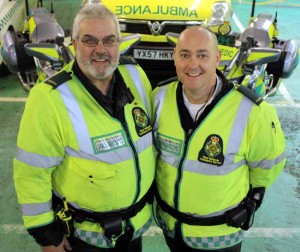By Dave Woodhall.
Cult heroes come in all shapes and sizes, but few can be more unlikely than the stars of Channel 5’s Emergency Bikers, which has just finished its second series. Featuring the work of motor cycle-riding policemen and paramedics, the programme has made stars of a group familiar to anyone who passes along Cherry Street in Birmingham city centre.
We met up with biking paramedic Steve Harris, who has been with the ambulance service for more than 30 years, as he was waiting for the next emergency call.
“Hopefully it’ll be a quiet day” he says. “That’s what we always want.”
Did you ever think you’d become so well known?
“I knew people would see us if we were on television, but I didn’t think it would be as big as it is. Channel 5 is very happy with the ratings; it’s exceeded all their expectations.”
So happy are they that a third series has been commissioned and is being filmed at the moment – indeed, we had to share a few moments of Steve and his colleague Mark Hayes’ time with a camera crew.
How did the idea come about?
“Three years ago we did a short piece for BBC’s Inside Out and the intention was that they were going to run a programme about us. That option wasn’t taken up but the television company RDF thought it was a good idea and made it. Barry was in series one but he’s had to retire now through ill-health. Mark and I have been in both series and will be in the third.”
Do you find that passers-by take more notice of you now?
“We’re based in the city centre, I’ve got a motorcycle next to me, I’m wearing a yellow jacket and I’m a big fellow with a beard so I’ve never really blended in with the background. People who’ve seen the show know this is one of our regular haunts so they do come in to see us. One lady came from London recently; her young son was a bit obsessed by the show so she brought him up. We’ve also got a Facebook group called Emergency Bikers on 5 that’s very popular, they’ve got over 1,200 members and a lot of discussion going on.”
We should never forget that you have a job where lives can be at stake. Does having been on TV ever cause any problems in that respect?
“Sometimes I turn up at a scene where the patient might recognise me and be aware that there may be cameras around. It can also be difficult to deal with people in the street, especially when you’re doing a job and they want to say hello. If I’m here there’s no problem at all but if I’m leaning on the floor next to a patient I have to be concentrating on them so yes, it does happen.”
Some of the actors in programmes such as Casualty have said they get mistaken for real doctors and nurses. Has that happened in reverse – do people ever think you’re an actor rather than a paramedic?
“Not yet, but we have been asked about whether any of the incidents are filmed after they’ve really happened, or are staged. No, what you see on TV is what’s actually happened, it’s all filmed live as it takes place.”
Do you ever wish you’d refused to take part in the show?
“No, not really. Sometimes the filming schedule can be quite lengthy, if we end up having to fit in with the crew and they’re editing. You get used to wearing a camera or having the crew filming you. When we first started we were aware of it, but now we don’t take much notice. Everybody likes to think they do a good job and so far we’re showing on TV what we do. That was the idea of the show, to give the public an idea of our role as paramedics.”
There’s a perception that the emergency bikers are some sort of first response unit, assessing the situation until the ‘proper’ paramedics can turn up.
“That’s not true at all. I’m doing exactly the same as any other paramedic. My treatment of patients and skill level is exactly the same. A lot of people don’t understand what we do and the equipment we carry. I can do everything an ambulance paramedic does, such as CPR (resuscitation), drug intervention, I do all that. The only difference is that I can get there a lot quicker.”
Updated 28 March: Picture changed.



